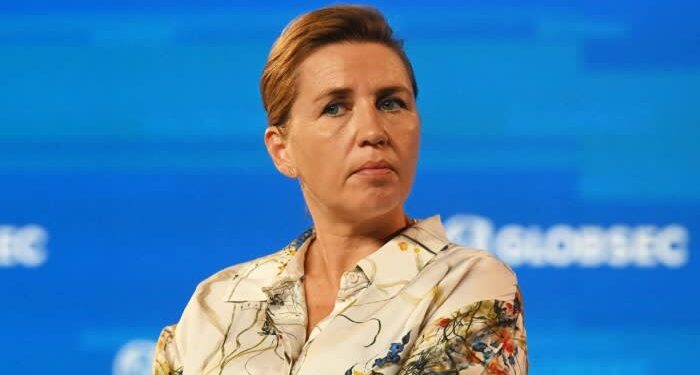Simply sign up to the Geopolitics myFT Digest — delivered directly to your inbox.
Europe should depend less on China for technology and show it has learned its lessons about relying too much on a single supplier, as it did previously with Russian oil and gas, Denmark’s prime minister has warned.
In an interview with the Financial Times, Mette Frederiksen urged Europeans to change “our attitude, the way of looking at the world, which is based on peacetime”. Instead, she called for greater awareness of Beijing’s role in allowing Russia to extend its invasion of Ukraine into a third year.
“I don’t think it would be possible for Russia to continue this full-scale war and at the same time work as they are doing in other areas of the world without being helped by China,” Frederiksen said.
Europe must invest more in homegrown technology, the Danish premier added. “We were too dependent on Russian gas and oil and now we’re repeating the same with China on many technologies, which is a big mistake.” She would not say whether trade restrictions were needed to wean the European economy off Chinese goods.
Frederiksen, a Social Democrat, was attending the Globsec security forum hosted for the first time this year by the Czech Republic, whose president Petr Pavel also stressed that “of all countries, China is in the strongest position to end Russia’s aggression in Ukraine”.
Joseph Wu, secretary-general of the National Security Council of Taiwan, separately told the FT at the forum that, rather than just focusing on boosting its own industry, Europe could cut reliance on China by building up “a resilient democratic supply chain” with “like-minded partners” such as the US, Japan, South Korea and Taiwan.
“If you look at what happened in Ukraine in the aftermath [of Moscow’s invasion], the reliance on Russian energy suddenly became a tool, played by the Russians,” said Wu, who was previously Taiwan’s foreign minister. “So in the future, if we trade more with China and if we do more business with China in a way that we do not think about our potential risk, the Chinese government may quickly turn that into a weapon against European countries.”
Wu added that, while Europe talked about “de-risking” and reducing trade links with China, some European countries “still think about doing more business with China”. German direct investment in China has risen sharply this year, according to Bundesbank data.
Frederiksen also said Denmark was pushing for the EU to act against Russia’s shadow fleet — ships used by Moscow to circumvent western sanctions — which helps sustain its economy and war in Ukraine.
Frederiksen said Russian oil tankers that have crossed the Danish straits, estimated at more than 200 since the Kremlin’s all-out attack on Kyiv in February 2022, presented an environmental risk. “I think everyone in Europe agrees that we need to handle this,” she said.
But she would not say exactly how and whether action might go as far as banning Russian vessels from sailing across her Nordic region.
Denmark was one of the first countries to offer Ukraine its stock of ammunition and Copenhagen also started in July transferring F-16 aircraft to Kyiv. Frederiksen urged other western allies to remove any remaining “red lines” over sending more weapons to Ukraine. She also said no limits should be placed on how Kyiv uses them, beyond demanding that their deployment remains within international law.
“We don’t have time to delay any more and I think that this discussion should stop,” Frederiksen said. “When you are facing a war like the Ukrainians, with global consequences for all of us, the idea of defining red lines is simply giving the enemy good cards in their hand . . . Limits on donations are simply a mistake . . . What is needed in Ukraine, we should give them.”
Source link : https://www.ft.com/content/fb5d678f-d828-460b-b683-caade2b04fe3
Author :
Publish date : 2024-09-02 07:00:00
Copyright for syndicated content belongs to the linked Source.


